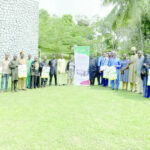The scars of devastating effects by flooding are felt across the Northern region even when the rainy season is over. Indeed, this year’s flood, according to experts, is similar to that which occurred some 40 years ago. In this report, the Northern Bureau Chief, MUHAMMAD SABIU, looks at the effects of flooding in the North and the risks of a looming food crisis.
With floodwaters now appearing to be receding, following and destruction across the country, more than 600 deaths have been recorded, while thousands of houses were equally destroyed. For instance, according to reports, in the North East, over 150,000 hectares of farmlands were destroyed, about 4,000 hectares of farmlands were submerged, and over 140,000 people are now in camps for internally displaced persons (IDPs) across the region.
It would be recalled that the Nigeria Hydrological Services Agency (NIHSA) had earlier predicted the impending flood, which they revealed might persist till the end of the last quarter of 2022. But experts had said the calamity could have been avoided if the government had taken proactive measures. According to experts, the torrential rainfall which occurred throughout the season was the major cause of the flood in most states of the North.
Added to it was the opening of the Lagdo dam by Cameroon, which contributed to heavy flooding that has affected millions of people.
Agriculture worst hit
Agriculture has reportedly remained the worst hit as a result of flooding. For instance, in the North East alone, more than 150,000 hectares of land have been destroyed. Investigations revealed that farmers in the zone have expressed concerns over large-scale destruction of their produce, saying the damage caused by the flood could be estimated at N30 billion.
A farmer, Biturus Alvadi, said the flood destroyed rice, maize, sorghum, millet, beans, groundnut, and hundreds of livestock.
Corroborating the farmer’s position is Kenechukwu Onuorah, an expert at Global Rights, an international human rights capacity-building non-governmental organisation, who posited that one major consequence of persistent flooding is the huge impact it will have on agricultural output.
Food scarcity looms
Onuorah said with the devastating effects of floods, basic foodstuff scarcity is imminent, adding that “the persistent rain may be good because it creates swampy lands that are good for the plants, but flooding is a disaster”.
He said: “It comes with erosion, especially in the South, and washes away the plants. It destroys the crops and even livestock will have nothing to feed on,” he said.
Onuorah also noted that the persistent flooding and rainfall is fuelled by climate change due to global warming, poor urban planning, overflowing dams among others.
Indeed, the unpleasant scenario, it was gathered, had left the country, especially the Northern region, in serious dilemma as the region looks set for an impending food shortage.
A small scale farmer, Yusuf Kudan, painted an ugly scenario of the situation. He said before this time, he used to produce 30 bags from his small farm but as a result of the torrential rainfall this year which resulted in heavy flooding in his area, he hardly produced 5 bags. According to him, hundreds of farmers had suffered the same fate.
Also speaking, Bitrus Alvadi a farmer from Adamawa state, told the Nigerian Tribune that this year, he has nothing to show from his farm because flood has prevented him from farming. He gave a graphic picture of his experience this way: “I harvested nothing this year. The flood usually comes around September ending. Usually, before this time, I used to harvest some crops but this year I couldn’t harvest the crops because the flood came early and submerged my farmland. That’s why it affected my farm. All my hope is on my farm. I used what I have to farm as an investment, expecting that I would harvest what I had put on the farm to take care of my needs or to solve my problems. But now, as the situation were, I am hopeless.
Another Adamawa state farmer, Boyomoso Eli, described this year’s flood as a disaster, saying: “I couldn’t farm. I left everything in the hands of God rather than waiting for man to assist me.”
He, however, said they could recover their losses if some organisations decided to assist them.
According to him, all what they need from these organisations and the government are seedlings to be able to do dry season farming.
Another farmer, Shafi’i Yau, from Kaduna also noted that “though every year, our community witnessed flood and the effects were always devasting, this year’s flooding was something else.
He said their vegetable farm had been submerged by the flood, making it impossible to farm.
“Our situation this year is unbelievable and unbearable. To say the least, we are hopeless,” he declared.
Salisu Yusuf, a fish farmer from Kaduna, also lamented that the devastating effects of the flood have affected fishermen as they couldn’t fish because of flood. He said the waste products have blocked most of the passages and this has affected the rivers.
ALSO READ FROM NIGERIAN TRIBUNE
Findings revealed that an estimated 500,000 farmers in the region are affected, thus sending very serious signals on an impending food scarcity.
This is coupled with the insecurity which has ravaged the region. According to Yau Dansadau, bandits have taken over their farmlands and most of the large scale farmers in Zamfara state can no longer farm. He said many now farm in small scale and in some instances, they paid taxes to the bandits to allow them to farm. For instance, in Dankurmi area, there are some farmers who could hardly produce what they used to. One of such farmers is Mamman Nura Kashabuda, who produced 5,000 bags a year but could hardly get 50 bags. Also, Alhaji Sani Buku, who produced 4,000 bags said he could hardly get 100 bags.

Preventive measures
According to Onuorah, there is so much we could do that we are not doing.
He said: “We must ensure appropriate urban planning, and drainage systems. Government at all levels must work to set Nigeria on the path towards greener renewable energy in order to reverse the effects of climate change. Unfortunately, the government is not working in that direction yet.”
The NIHSA had also said flooding would persist, because Nigeria is located within the River Niger Basin, which is occupied by nine countries, namely: Benin, Burkina Faso, Cameroun, Chad, Cote D’Ivoire, Guinea, Mali, Niger and Nigeria, and with Nigeria at the lowest portion of the Basin, this means that once the upper catchment of the Basin gets flooded, Nigeria should be prepared to experience flooding.
The agency also warned that the situation at Kainji and Jebba Dams on the main River Niger and Shiroro Dam on the River Kaduna in Nigeria calls for vigilance.
It, therefore, advised the management of the three dams to always free up space in order to accommodate waters from the upstream countries.
“This is a flood warning signal and calls for critical watch at all the periods,” NIHSA said.
Need for humanitarian assistance
Benson Agboro, a Red cross official, said its volunteers are working in 11 states to battle the effects of flooding and ensure the affected farmers can still find means to sustain their livelihoods.
Also Ibrahima Yakubu, an environmental journalist, said: “We met farmers who lost large number of hectares due to flooding. What is worrisome is, for a long time, these farmers keep losing hectares of their farmlands every year. This is worrisome.
“Food scarcity is imminent. We should prepare for the worst. How do you expect them to produce the food we want to eat when there is no land to cultivate?”
Nonetheless, Yakubu still believes government should assist the farmers with money, fertilizer, seedlings, etc., so that they can be involved in dry farming.






